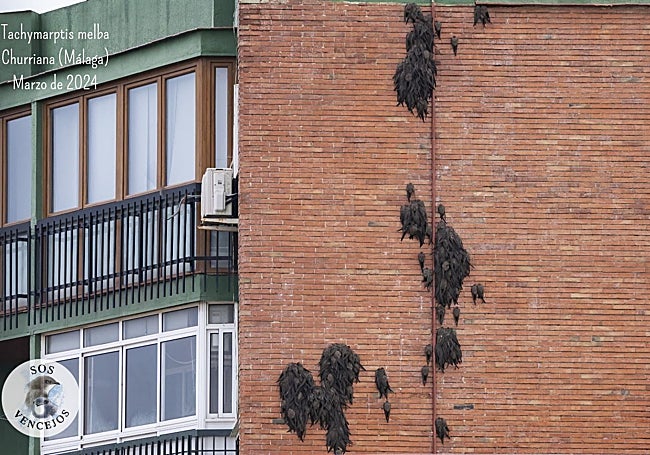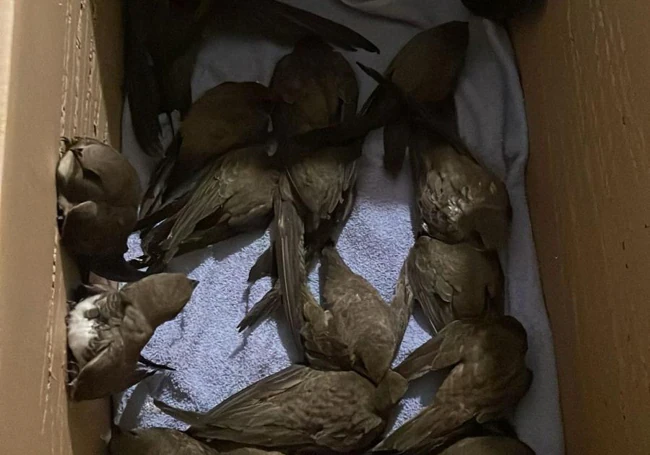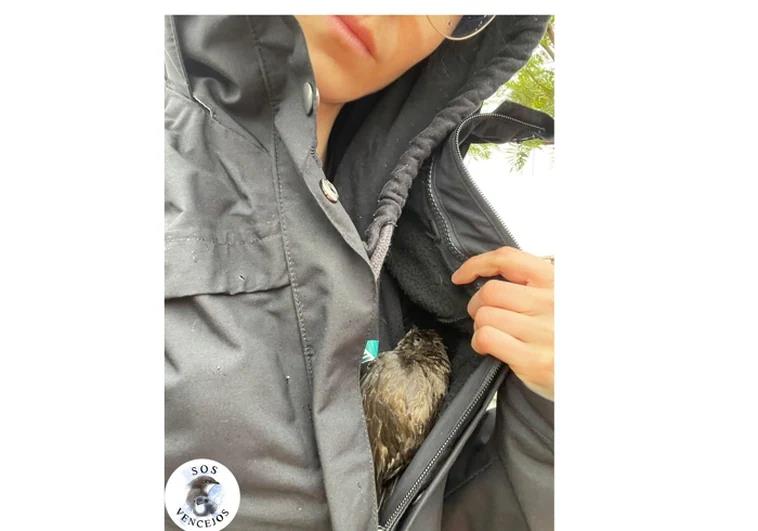Hairdryer and electric blanket help save a flock of exhausted alpine swifts that rained down in Malaga
Young veterinarian and animal activist Laura Muriel managed to rescue 20 of these protected birds that were found in distress, clinging to the facade of a building
The story of Lindt and his travelling companions began on 31 March. These were the days of the only heavy rain thus far this year in Malaga, with several, consecutive days of rainfall. This bad weather caught a flock of alpine swifts offguard flying over the city in the midst of their migration from Africa to Europe. "A lot of water fell on them, the poor things had nowhere to take refuge and sought shelter by clinging to a tall building". This is a tale of Laura Muriel, a 28 year-old vet specialising in wild and exotic animals. She is also an activist with the animal association SOS Vencejos (a rescue and conservation association for swifts), which made it possible for her to rescue around twenty specimens of this protected species... right near her home.
The area in question is in the district of Churriana, specifically in Calle Ricardo López Barroso. Swifts do not normally nest in the city of Malaga but more inland - for example, in places such as the Cueva del Gato (Cat Cave) in the Serranía de Ronda and other rocky areas and cliff edges. These birds have very short legs because their anatomy is 100% adapted to near-constant flight, which is why they never rest on the ground, instead clinging to walls as if they were bats. On those days of heavy rain, dozens of them clung to the front of the building, to the point that it looked like a big dark stain on the wall and the local residents were alarmed.

Zoom

In fact, it was one of the residents of the estate who raised the alarm on SOS Vencejos' website that there were many birds in distress. So that was when Laura Muriel went into action. When she arrived, what she found were numerous birds lying on the ground, soaking wet and barely able to move. "We were picking them for three days, all the time it was raining. On the road, on roundabouts, under cars, from everywhere.... It was a shower of swifts!"
The Lindt surprise
In total, the activists recovered 22 live specimens, which the vet took home for safe-keeping. "We dried them one by one, hooked onto an office chair, with a hairdryer. Then we kept them warm with an electric blanket." When they had warmed up to a normal body temperature, they were rehydrated: those in the worst condition were hydrated by injection; the strongest, by mouth with a syringe.
And that's when they discovered that one of the rescued swifts was ringed, something that is unusual for this species. It had been tagged when it was still an almost newborn chick in its mother's nest in Baden, a town in Switzerland. For this reason, the Malaga activists named it Lindt after the famous Swiss chocolate brand. The bird was born in 2015, so it was nine years old at the time of its rescue. They also contacted the ornithologists who had initially tagged him so that they could study his migration patterns.

Zoom

The vast majority had hypothermia, were tired and hungry and half their normal weight (50-60g as opposed to 100g), so they needed about two weeks to gather the strength to fly again. One came in with pneumonia due to aspirating rainwater and was "admitted" for several more weeks of care, but recovered very well. For this bird and two others with leg problems, recovery took over a month and the last one was released towards the end of April. There were two fatalities, but the vast majority flew perfectly well once they had recovered their strength.
This operation to rescue alpine swifts was a milestone for this wildlife rescue organisation at a national level. "The moment of receiving the message from the local residents, seeing that nobody was doing anything to help and collecting so many animals in the rain for hours on end was frustrating; we were at the same time looking for live birds, seeing dead ones and carrying birds on our own bodies so that they wouldn't die of the cold. I kept telling myself that I should have got there earlier," recalled Laura Muriel. But in the end, she ackowledged the good that came out of it: "It was a satisfactory outcome in that we rescued 22 and the casualties were very few, 20 of them were saved."
In general terms, all species of swift are legally protected in Spain. Moreover, specialised research groups such as the Spanish Ornithological Society (SEO) consider it to be a vulnerable species, and it is included in the Red Book of Spanish Birds (endangered species of avifauna) and in the List of Wild Species under Special Protection Regime.

